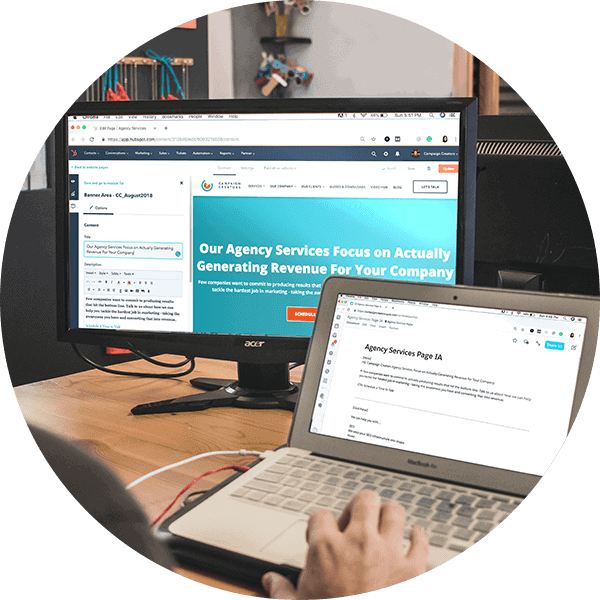
Our Favorite HubSpot Feature Announcements at INBOUND19
September 25, 2019
What Does the New BERT Algorithm Say About the Future of SEO?
November 12, 2019Low-hanging fruit.
Our approach to boosting the revenue of any client we partner with is to build strategies that appreciate in value over time. The compounding effect of our marketing tactics result in steadily increasing ROIs that grow your revenue for years to come. This long-haul approach, however, requires an upfront investment that has to be justified in the short term. This is why we love the low-hanging fruit.
A successful inbound content strategy can take as long as 12 months to start working. In the mean time, we look for quick wins to show a short-term ROI that can put everyone at ease. One of these quick wins that works especially well for manufacturing and other B2B industrial companies is a successful* Customer Relationship Manager (CRM) implementation.
* Purchasing a CRM does not ensure success.
To give you an idea of how much a CRM can impact your revenue, consider:
- The average ROI for a successful CRM implementation, including the cost of hiring a partner agency, is 7.7x.
- Successful CRM implementations boost revenue (on average) 41% per sales person.
- Marketing teams who have access to a company-wide CRM deliver 3x more revenue than marketing teams without real-time access to customer information.
Let’s break down the parts of a successful CRM implementation and talk about why you might want to partner with an agency to accomplish it.
1. Bringing Everyone to the Table
A successful CRM implementation starts with buy-in from senior management because, in most cases, sales teams are too resistant to change to successfully implement a CRM on their own. The marketing team convincing everyone to upgrade is even less likely to happen.
Before any kind of implementation plan can happen, senior management has to be sitting at the same table with sales and marketing and lighting the fire under the seats.
How an agency can help:
Bringing an outside party to the table shows your teams that you’ve made a real commitment. In addition, an experienced agency will be able to communicate proper expectations to everyone in the room and offer insight into the implementation process. Having a guide in these early planning stages ensures that your teams don’t end up off-track and discouraged.
2. Choosing the Right CRM
There are a number of CRMs to choose from, including the option to build your own custom CRM to best serve any unique needs you may have. While you’re shopping for CRMs you’ll want to consider:
- The specific needs of your different teams
- How easy it will be to import your existing data
- How you’ll integrate any other tech your using
How an agency can help:
It goes without saying, but an agency is going to have first-hand experience with most of the top CRMs available on the market. An agency will also have access to integrations developers who can help out with larger and more complex implementations. If you’re not sure which CRM is right for your company, why not ask someone who knows your company and also knows the CRM market?
3. Building Processes that Work
Buying a CRM and importing customer data doesn’t guarantee any degree of success or ROI. If it did, the failure rate of CRM implementations wouldn’t be as much as 90%.
In order to beat those odds, companies have to adopt processes that produce shared benefits for everyone involved. Not everyone will immediately love your new CRM. One common complaint in the middle of any CRM implementation is that sales productivity is suffering due to increased data entry expectations and having to learn a new system. If sales doesn’t also gain significant benefits from your CRM implementation, they have no incentive to maintain data accuracy and your implementation will fail.
In this case, sales needs to see how accurate data helps marketing to deliver better qualified leads. They need to see how automation processes can ease the burdens of data entry and even increase their overall productivity.
While this is only one example, this scenario will likely occur all over your company. The key to success is to identify these problems early and respond in a way that adequately incentivizes your workforce.
How an agency can help:
An agency with experience in business development, marketing, and sales will be familiar with most issues that you can expect during a CRM implementation. They will also be experienced at building processes that incentivize company-wide adoption, and they can provide feet-on-the-ground training within your marketing and sales teams.
4. Maintaining a Focus on Revenue Growth
Every team within your company, and likely every person on those teams, will have a different set of priorities when it comes to choosing or using a CRM. Transparency, accountability, communication, customer support, customer retention, productivity, security, forecasting, insight, analytics, benchmarking — these are all great things to expect from any CRM, but your singular focus has to be revenue growth.
By maintaining a focus on growth, you automatically incentivize every member of your team to fully adopt the CRM. In addition, every single other priority will fall in line when company growth sits at the top of the list.
Maintaining focus isn’t easy, and it has to start at the top with senior management. Sales also must recognize their role in the success of your implementation strategy, but once you begin to demonstrate real growth it shouldn’t be hard to keep that momentum.
How an agency can help:
An agency with experience in successful CRM implementations will recognize the importance of that singular focus on revenue. They will spend extra time and attention with senior management and sales and provide motivation and education on the real value of a fully functional CRM.
5. Establishing Ongoing Support & Accountability
Once a CRM is fully implemented, its success or failure will depend on how your management decide to use the information they receive. Will you use the transparency of the CRM to scrutinize every sales call and cast a shadow over the shoulder of your sales team? If so, you can expect failure. Your team will quickly learn which inputs earn criticism, and that data will certainly lose its accuracy.
Instead, management needs to use the transparency of the CRM as an opportunity to improve your teams and processes through coaching and support. If sales (or any team) sees their adoption of the CRM resulting in greater support and training opportunities, the likelihood that your CRM implementation will succeed increases exponentially.
How an agency can help:
An agency with experience in marketing and sales coaching can assist management in pinpointing opportunities for coaching and practical support (and also provide that coaching for your teams). Also, an agency will be sensitive to the ways in which management might be misusing the CRM to discourage their teams and will have the opportunity to speak up and address the issues.
Why does it work so well for B2B Industrial & Manufacturing Companies?
In our experience, some CRM implementations work better than others. For manufacturers, that success rate seems to be a lot higher. It’s not always easy to say why that is (or to predict any kind of outcome), but in this case we think it has to do with the starting point.
Our CRM implementations are most likely to succeed when we come into a company that has a fragmented relationship between marketing and sales and no significant investment in modern marketing or sales technologies. We’ve found this to be a fairly accurate description of the average manufacturing company.
If you feel like your business would benefit from a successful CRM implementation, or if you would like to talk about any other marketing and sales challenges that are keeping you from growing your revenue, we’d love to hear from you.








